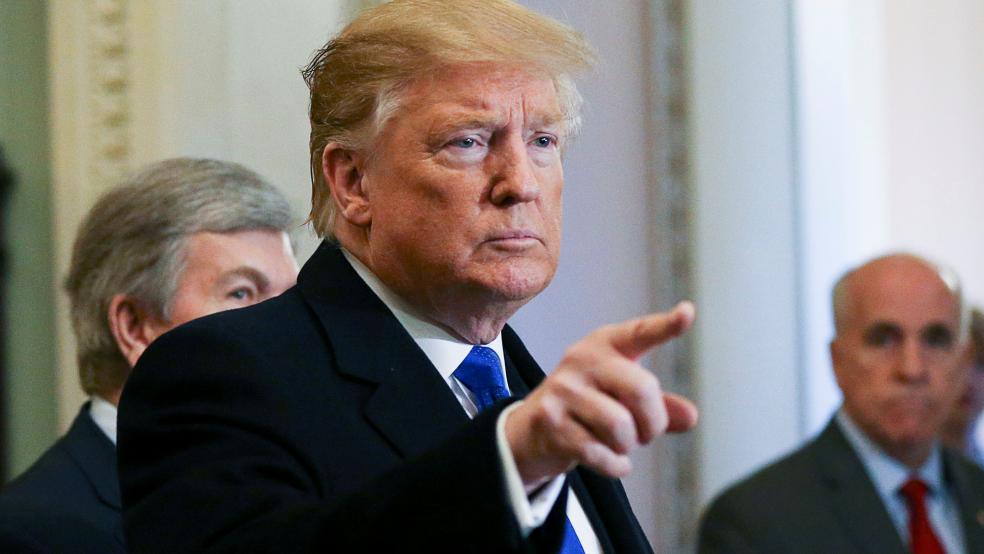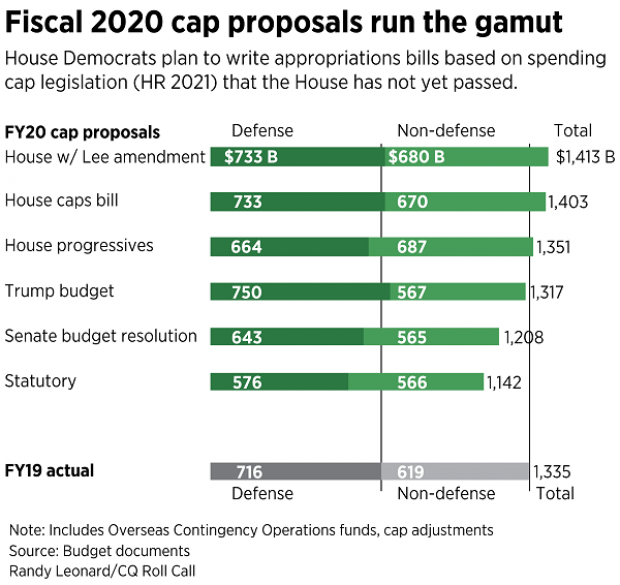Now that Congress is back from its two-week recess, lawmakers will have to tackle some looming budget-related issues, including spending levels for fiscal 2020, a stalled disaster aid package and a potential infrastructure deal.
A 2020 Spending Deal?
Lawmakers will need to agree to raise defense and non-defense spending for next year or face the prospect of steep automatic cuts set to take effect under a 2011 law. But the Trump administration and Democratic leaders are more than $100 billion apart in their overall non-defense spending plans for next year, Roll Call reports, with a chart to illustrate the various proposals released thus far:
Against that backdrop, staff-level talks between Congress and the White House have reportedly made little progress. The Hill says that President Trump and Senate Majority Leader Mitch McConnell are “on a collision course” regarding the talks. “Trump has given the GOP leader some time to work with Democrats but doesn’t want the talks to drag on all year and lead to an agreement that would increase spending — and the budget deficit,” The Hill’s Alexander Bolton writes.
Rather than raise spending, the White House is reportedly ready to accept a stopgap measure that would keep spending for all of 2020 at 2019 levels, with supplemental legislation to boost the military. McConnell and other lawmakers prefer to reach an agreement on spending and avoid a stopgap bill, in part to allow appropriators to adjust specific funding levels for next year.
Democrats, meanwhile, have been pushing for higher non-defense spending, on par with increases on the defense side. House Democrats plan to forge ahead with the first of the 12 annual spending bills required to fund the government, starting with the potentially contentious Labor-Health and Human Services-Education bill. Democrats reportedly hope that they can gain some leverage in the spending talks by forging ahead with their appropriations bills.
But with little sign of fast progress, the White House’s patience may be wearing thin, Bolton reports — and “White House officials are leery of where the talks may lead, noting that the last bipartisan deal reached in early 2018 boosted spending by $300 billion over two years.”
Can Congress Fix Its Disaster-Relief Disaster?
A bill that would deliver more than $13 billion to areas affected by wildfires, hurricanes, tornadoes and other natural disasters has been hung up as the result of a contentious dispute between Trump and Democrats over aid to Puerto Rico. The president has criticized Puerto Rican officials over their handling of relief money and has come out against providing more aid. Democrats, meanwhile, have insisted on freeing up previously appropriated funds and providing increased aid.
“Negotiations to resolve the impasse have been fitful and the outlook is uncertain,” The Washington Post’s Mike DeBonis and Erica Werner report. “There is a strong desire among lawmakers of both parties to reach a deal, but also increasingly bitter acrimony on both sides about how the dispute has played out.”
Still, lawmakers may feel a sense of urgency to get a disaster relief package done.
“Senate Republicans came back from a meeting with Trump prior to the two-week spring break with renewed optimism they’d be able to reach a deal,” Roll Call’s Paul M. Krawzak says. “Affected states like Georgia and Florida, represented by Senate Republicans, were relatively close calls for Trump in 2016. And Iowa, like other Midwest states hit hard by recent flooding, is always a presidential bellwether and one Trump needs to keep in his corner.”






